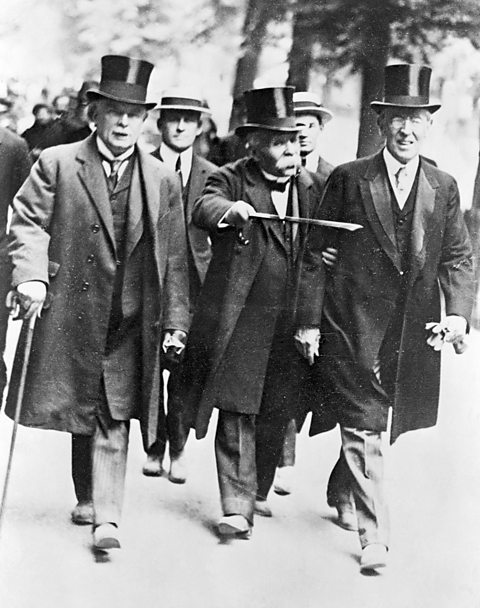The Paris Peace Conference

Delegates from 32 countries met in January 1919, but the conference was dominated by the Big ThreeThe leaders of Britain (David Lloyd George), France (Georges Clemenceau) and USA (Woodrow Wilson)..
Negotiations were difficult as the Big Three had different aims:
Wilson's aims:
- to end war by creating a League of NationsAn international organisation where the leaders of countries could settle problems in the hope that they could avoid wars. based on his Fourteen Points
- to ensure Germany was not destroyed
- not to blame Germany for the war - he hated the Guilt Clause
Clemenceau's aims:
- to punish Germany and ensure it was too weak to attack France again
- to return the Alsace-Lorraine region to France
- he accepted the League of Nations but believed it would need to be strengthened to deal with Germany
- an independent Rhineland which would weaken Germany
- huge reparations
- to disband the German army so that Germany would never be strong enough to attack France again
Lloyd George's aims:
- to please the electors who wanted to
make Germany pay
- to leave Germany strong enough to trade with
- to safeguard Britain's naval supremacy
In December 1918 David Lloyd George had won a general election. He was aware that the people who had voted for him wanted revenge on Germany. Slogans such as Hang the Kaiser
were popular with the British people. His aim was a "just peace" that would balance the will of voters with economic need to continue trade with Germany.
Fontainebleau Memorandum
On 25 March 1919, Lloyd George issued the Fontainebleau Memorandum. He was concerned that a harsh peace settlement would result in a hostile Germany. It shows the divisions between the Big Three
at Versailles. Eventually a compromise was reached which resulted in the Allies occupying the Rhineland for 15 years. This satisfied Clemenceau as it provided security against a future German attack.
The Germans were shown the proposed Treaty of Versailles, with no option for negotiation. The Germans published a rebuttal, arguing that the treaty was unfair, but they were ignored. On 28 June 1919, the delegates met at the Hall of Mirrors in the Palace of Versailles, near Paris, and forced two Germans to sign the treaty.